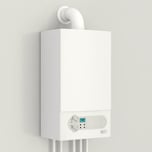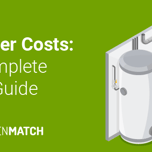Answer these simple questions and we will find you the BEST prices
Which type of solar quotes do you need?
It only takes 30 seconds
100% free with no obligation

Get up to 3 quotes by filling in only 1 quick form

Slash your energy bills by installing an energy efficient boiler

We’ve helped over 500,000 homeowners reduce their carbon footprint
- GreenMatch
- Boilers
- Electric Boilers
Electric Boilers: All You Need to Know

What is an Electric Boiler?
Electric boilers operate similarly to gas and oil boilers, however as the name suggests, it uses electricity to generate heat for your home. Whereas oil and gas boilers use combustible fuels, and biomass boilers use biological material.
One of the main standout benefits of electric boiler systems is that they are highly efficient compared to other types of boilers. Furthermore, depending on how your electricity is generated it can also be a much more sustainable and environmentally-friendly option.
However, as boilers get older they become less efficient, which isn’t great for your carbon footprint or pocket!
If you’re thinking about upgrading your boiler to a more efficient one then you want to make sure that you’re getting a top-quality model without being overcharged. In this case, it’s a good idea to compare different boiler quotes so that you can find the most energy-saving and cost-effective option. To do this, simply click on the button below, and we will send you up to 3 free comparison quotes from local installers.
- Quotes from local engineers
- Payment by finance available
- Save up to £975
It only takes 30 seconds



Types of Electric Boilers
An electric boiler can come in a few different forms, one of the most common being an electric combi boiler. You may also come across an ‘electric water boiler’: be careful, as this is not the same as an electric boiler! Electric water boilers are what you use to boil water when you want to make a tea or a coffee, and not for heating your home.
Below, we have listed the most common types of electric boilers. We have also referred to their pros and cons so you can determine which is the most suitable for your home. If you are looking for specific models, then we recommend you reading our article on best electric boilers 2025.
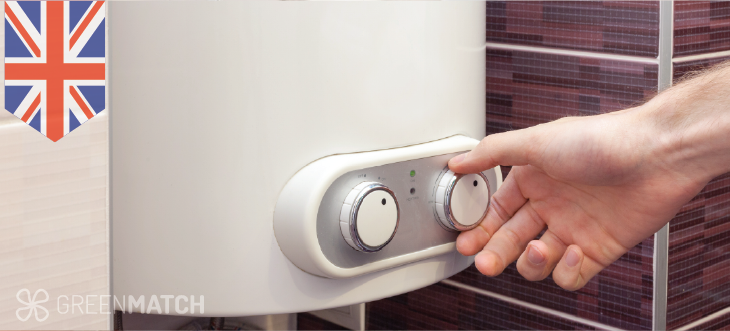
Electric combination boilers
As mentioned above, this is one of the common types of electric boiler systems. It is sometimes also referred to as a direct system because it can provide both hot water and central heating within a single unit. Having this type of boiler means you’re able to have more control over the temperature in your home, as you can change it instantly and have hot water on demand.
Also since it is a single system, they are great for smaller homes and generally cheaper to install compared to other types of boilers. One downside, however, is that since combination boilers don’t require an extra water storage tank this means you cannot take advantage of the cheaper night-time Economy 7 tariffs.
Electric system boilers
A system boiler requires an unvented cylinder to store hot water, but otherwise all of the components are built into the boiler itself. This is because it takes its water supply directly from the mains, eliminating the need for an extra water tank in the loft (unlike a regular boiler). As well as electricity, it’s also common to fuel system boilers with oil or gas.
Electric system boilers are not as compact as combination boilers due to the cylinder, however, they don’t require as much space as regular boilers and can still meet higher demands for hot water. Additionally, some models can benefit from Economy 7 since you can heat the cylinder overnight. For this, you will need a two-tariff electricity meter.
Electric regular boilers
A regular boiler, also known as a heat-only or conventional boiler, heats and stores hot water for when you need it, rather than providing it on demand. As well as electricity, this type of boiler is also commonly fuelled by gas or oil.
Regular boilers require more space compared to other types of boilers, as they need a hot water cylinder and a cold water feed tank to function. This means they are better suited for larger homes.
Storage boilers
An electric storage boiler is like a mix between a system and combination boiler, as it comes with a hot water tank within the same unit. This means it is eligible for the Economy 7 tariff, which can help reduce your energy bills. However, due to storing water their overall running costs are still likely to be more expensive when compared to an electric combination boiler.
Dry core storage boilers
Dry Core Storage boilers work differently from other types of boilers since the heat is not circulated. They work by heating the bricks of your home during the night. The heat from the bricks is then released into the water tank, which can then be used for hot water or central heating.
Similar to storage boilers, you can take advantage of the Economy 7 tariff at night, saving you money. Dry core storage boilers are considered to be more versatile in comparison to storage boilers since you can release the heat into the water as needed.
Electric CPSU boilers
The combined primary storage unit (CPSU) boilers are best suited for larger buildings with a high demand for hot water. This is because they are capable of storing a high level of hot water within the boiler tank and therefore are able to provide it quickly and at a high pressure.
However, this type of boiler is typically more expensive and requires a lot of space. Therefore, it’s more commonly used for commercial buildings in the UK, such as hotels.
Solar compatible boilers
A great environmentally-friendly option for your home is a solar compatible boiler. These are boilers which have an immersion heater, as this can be connected to the solar panels. This is also sometimes referred to as a megaflow boiler.
Generating energy from your own solar panels also means you don’t have to rely as much on energy suppliers.
How Does an Electric Boiler Work?
Electric boilers work fairly simply. They are connected to the mains electricity supply as well as the mains water supply. When hot water is needed for your home, the cold water from the mains is passed through an electric heating element. This heated water is then pumped through to your radiators and taps, ensuring your home is at your desired temperature.
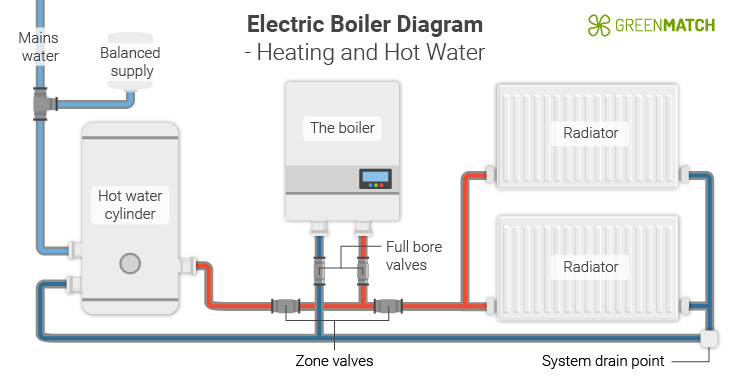
For electric boilers without a hot water cylinder:
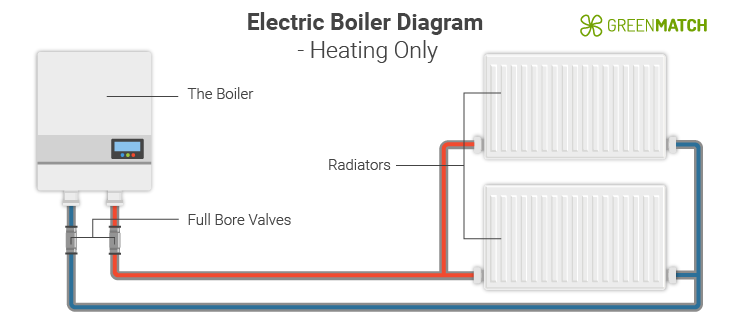
Electric Boilers: Cost in the UK
When buying a new boiler you’ll need to take into consideration the upfront costs as well as the installation costs.
In the UK, you can expect to pay between £500 - £2,500 for the electric boiler itself depending on the type, size, and brand. You should carefully consider what size boiler you need, as it can decide both the amount you'll pay and how well it will suit your needs.
Installation costs are typically £500 - £1,000. How much it is for you will depend on factors such as whether or not you’re having a like for like replacement, if you’re changing the location of your boiler, and even depending on where you live in the UK.
Considering the above, comparing offers from different installers in your area is a smart strategy to reduce your electric boiler’s total cost. Engineers’ rates tend to differ from heating company to heating company. So, it is an opportunity to save money and get offers specifically tailored to your needs and budget.
At GreenMatch, we are ready to help you find the best installers near you. Just click the button below and we will send you up to 4 comparison quotes completely for free. You are not obliged to accept any quote you receive.
- Quotes from local engineers
- Payment by finance available
- Save up to £975
It only takes 30 seconds



Electric boilers: running costs
As well as thinking about how much a boiler is going to cost you right now, you should probably also consider how much it’ll cost you in the future.
Currently, the standard rate for electricity in England, Scotland, and Wales is 28.3p/kWh, and if you take advantage of the economy 7 tariffs it’s 16.7p/kWh (September 2022). Unfortunately, this is still more expensive compared to other fuel types. However, if you do have your own renewable energy supply, such as solar PV panels, then you could generate this energy for free.
Grants for electric boilers
Unfortunately, there are currently no grants available for electric boilers. However, if your electric boiler is powered by solar panels you could benefit from 0% VAT and the Smart Export Guarantee.
As you can see, determining the total costs of an electric boiler can vary depending on multiple factors. When choosing a boiler it can be risky as you don’t know whether you’re getting the best value for your money or not. This is why it’s important to talk to professionals and compare prices.
Efficiency of Electric Boilers
When you're doing the electric boiler vs gas boiler comparison, you'll see that electric boilers have fantastic efficiency ratings compared to their gas counterparts and some other heating systems. Electric boilers usually have efficiency ratings of 99-100%, while gas boilers rarely have ratings higher than 93%.
However, with this being said, you should also consider how your electricity is generated. If you have an energy supplier who uses renewable energy then this is far more efficient and eco-friendly than a supplier who generates electricity by burning fossil fuels.
Pros of Electric Boilers
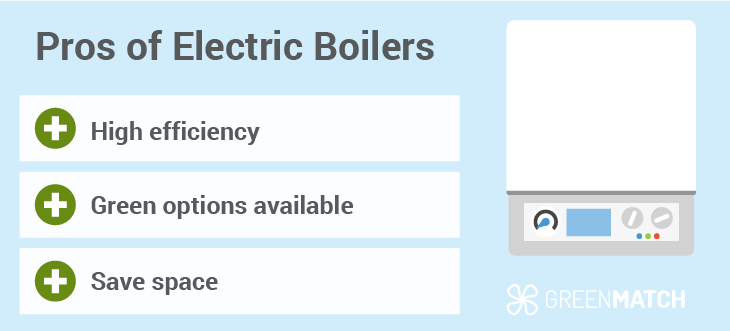
Electric boilers are a good investment for several reasons
If you don’t want to miss out on these benefits then all you have to do is simply click the button below. We’ll provide you with up to 4 free quotes from qualified installers in your area which you can objectively compare to get the best deal.
- Quotes from local engineers
- Payment by finance available
- Save up to £975
It only takes 30 seconds



Cons of Electric Boilers
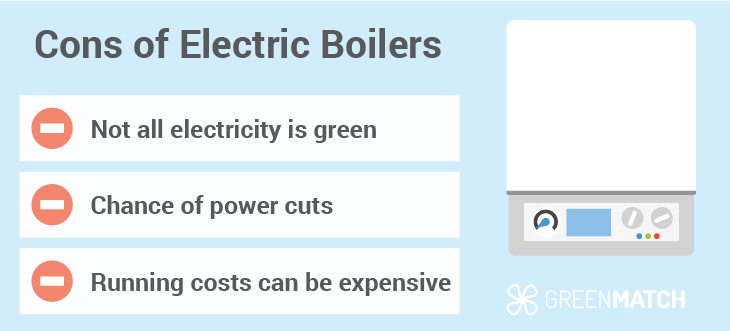
Even though electric boilers come with a lot of benefits, it’s still important to consider the disadvantages and whether or not it’s a good fit for your home:
- Not all electricity is green: Unfortunately many electricity suppliers still generate their electricity by burning fossil fuels. Therefore, it’s important to check whether or not renewable energy is available to you.
- Chance of power cuts: If you live in an area that’s susceptible to power cuts then a heating system which relies on electricity may not be the best option for you.
- Running costs can be expensive: If you are not able to generate your own electricity with solar panels then the running costs of electricity can be expensive compared to other fuel types.
FAQs
Electric boilers are a good option to consider for heating your home. They are highly efficient compared to other types of boilers, such as those powered by oil or gas, helping you reduce energy waste. Furthermore, it’s also possible to be more environmentally friendly with a green supplier.
Unfortunately, electric boilers are typically expensive to run compared to other fuel types. However, if your electric boiler is paired with solar panels then you can massively reduce your reliance on the grid as well as your running costs.
Yes, like gas boilers electric boilers can also heat radiators. The rule of thumb for electric boiler sizing suggests that you need 1.5 kW for each radiator in your home.
Yes, you can replace a gas boiler with an electric boiler. How complicated the installation is will depend more on whether you are also changing the type of boiler (i.e. regular to combi) and whether you are changing the location of the boiler within your home.
This will depend on what type of electric boiler you choose. For example, a regular boiler requires a tank whereas a combi boiler does not.

Brontë is an experienced writer and editor for GreenMatch. Her passion for sustainability and renewable energy drives her to stay at the forefront of green-energy trends.
We strive to connect our customers with the right product and supplier. Would you like to be part of GreenMatch?




